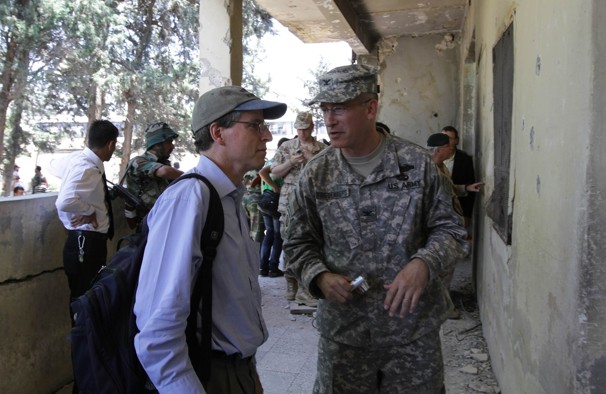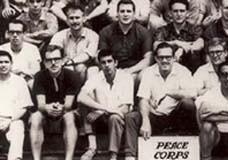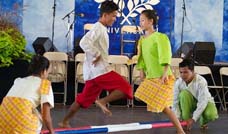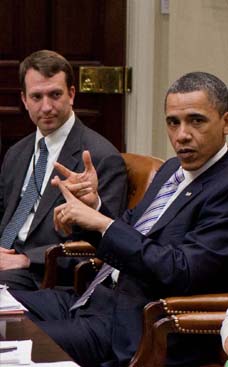
Acquaintances say Ford is hardly the sort to seek the limelight. But his trip to Hama - where he was greeted by cheering demonstrators waving olive branches - was the most significant gesture that the United States has made to support the Syrian protesters. "What he's done over the last few days shows he's someone who can act very effectively, in ways that are quite embarrassing to the regime," said Robert Malley, an analyst with the International Crisis Group. Ford's trip sparked a furious reaction from the Syrian government, which accused him of interference in its domestic affairs. Pro-government supporters stormed the U.S. Embassy in Damascus on Monday, breaking windows and spray-painting graffiti before finally being chased away by guards. After months of cautiously increasing U.S. criticism of Syrian President Bashar al-Assad, Secretary of State Hillary Rodham Clinton declared for the first time Monday that he had "lost legitimacy."
Morocco RPCV Robert Ford has changed the dynamic of U.S. relations with Syria by traveling to a tank-ringed city at the center of the protests that have swept the country
Low-key U.S. diplomat transforms Syria policy
Caption: Robert Ford, left, speaks with a military attache at the headquarters of a local security force where Syrian authorities said 82 policemen were killed on June 6. Photo: Louai Beshara/AFP/Getty Images
By Mary Beth Sheridan,
Published: July 12
U.S. Ambassador Robert Ford, known as a quiet, under-the-radar-screen diplomat, has changed the dynamic of U.S. relations with Syria by traveling to a tank-ringed city at the center of the protests that have swept the country.
Acquaintances say Ford is hardly the sort to seek the limelight. But his trip to Hama - where he was greeted by cheering demonstrators waving olive branches - was the most significant gesture that the United States has made to support the Syrian protesters.
"What he's done over the last few days shows he's someone who can act very effectively, in ways that are quite embarrassing to the regime," said Robert Malley, an analyst with the International Crisis Group.
Ford's trip sparked a furious reaction from the Syrian government, which accused him of interference in its domestic affairs. Pro-government supporters stormed the U.S. Embassy in Damascus on Monday, breaking windows and spray-painting graffiti before finally being chased away by guards.
After months of cautiously increasing U.S. criticism of Syrian President Bashar al-Assad, Secretary of State Hillary Rodham Clinton declared for the first time Monday that he had "lost legitimacy."
On Tuesday, the U.N. Security Council condemned "in the strongest terms" the attack on the U.S. Embassy and a similar assault on the embassy of France, whose envoy had also visited Hama. The Syrian government appeared to backtrack, arresting a half-dozen of the alleged embassy assailants and promising better security.
Ford's trip "was a very bold and - given the Syrian response - a very courageous step," said P.J. Crowley, a former State Department spokesman who has been urging stronger U.S. action on Syria.
For an unassuming diplomat, Ford has had his share of controversy in the past year. He was named ambassador to Syria in January on a "recess" appointment after Republicans balked at filling the post, which had been left vacant since the killing of former Lebanese Prime Minister Rafiq Hariri in 2005. Republicans were skeptical of the Obama administration's argument that sending an ambassador would advance Middle East peace.
Unless he gets Senate approval, Ford will have to leave the post at the end of the year.
While criticizing the appointment, however, Republicans haven't questioned Ford's credentials. He is part of a group of State Department Arabists who were initially sidelined during the planning of the Iraq invasion but later made their mark as skilled analysts and pragmatic managers in Baghdad.
John Negroponte, a former ambassador to Iraq and senior official at the State Department, said Ford was known for his agreeable personal style.
However, he said, "you shouldn't let that fool you into thinking there isn't a great inner toughness."
Emma Sky, a former adviser to the U.S. military in Iraq, said Ford succeeded in two tours in Baghdad partly because he was a good listener who could put people at ease. She recalled that Ford opened what could have been a difficult meeting with the speaker of Iraq's parliament a few years ago by telling a joke in flawless Arabic.
"Any tension that was going to be there was completely defused," Sky said.
Ford joined the Foreign Service in 1985, after volunteering with the Peace Corps in Morocco and earning undergraduate and master's degrees from Johns Hopkins University.
Friends say his Peace Corps experience left him with a sensitivity to the experiences of the poor.
As a diplomat, it's easy "to run in the same circles as the host-country elite. He's somebody whose friends, earlier in his career, were shopkeepers and taxi drivers," said one colleague, who was not authorized to comment on the record.
Negroponte said Ford retained that enthusiasm to get to know people, despite the danger in Iraq.
"He was one of these very tireless people, with a huge Rolodex, who didn't mind putting on his flak jacket and helmet and going out of the Green Zone to meet contacts," he said.
Ford, who was born in 1958 and is a native of Denver, has served as ambassador to Algeria and was previously posted to Bahrain, Turkey, Egypt and Cameroon. His wife is also a diplomat, stationed most recently in Saudi Arabia.
Pro-democracy protests broke out in Syria in March, after the uprisings in Tunisia and Egypt. Since then, at least 1,400 civilians have been killed by Syrian security forces, according to human rights groups.
Ford has not spoken publicly about the latest incidents. But he wrote on his embassy's Facebook page on Sunday: "How ironic that the Syrian Government lets an anti-U.S. demonstration proceed freely while their security thugs beat down olive branch-carrying peaceful protesters elsewhere."
















